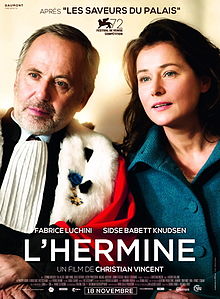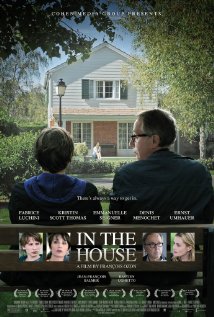By Film Noir Blonde and Michael Wilmington
In “Courted,” writer/director Christian Vincent transports us to the professional and private world of Michel Racine, a fussbudget French judge in the criminal courts. Racine is a memorable characterization, beautifully played by Fabrice Luchini, who received last year’s Best Actor prize at the Venice International Film Festival for this performance.
“Courted” (“L’Hermine” in French) had its West Coast premiere at the COLCOA French Film Festival in Los Angeles Wednesday night, the same night as its North American premiere at the Tribecca Film Festival in New York.
 The movie, which almost instantly recalls Sidney Lumet’s courtroom classic, “Twelve Angry Men,” shows Racine presiding over a brutal murder case, in which a 7-month-old child has died. The child’s surly father (Victor Pontecorvo) is the defendant. As the mechanics of the trial unfold, we meet the lawyers, the jury and a key witness, the child’s mother (Candy Ming). The jurors are a chatty bunch and one of them tells the group she has heard through the grapevine that Racine is known around the courthouse for his arrogance.
The movie, which almost instantly recalls Sidney Lumet’s courtroom classic, “Twelve Angry Men,” shows Racine presiding over a brutal murder case, in which a 7-month-old child has died. The child’s surly father (Victor Pontecorvo) is the defendant. As the mechanics of the trial unfold, we meet the lawyers, the jury and a key witness, the child’s mother (Candy Ming). The jurors are a chatty bunch and one of them tells the group she has heard through the grapevine that Racine is known around the courthouse for his arrogance.
But he’s also a human being with very human problems. Indeed, it’s a bit jarring to see Racine, at the end of the day, sans his regal ermine robe, ordering soup in the tacky hotel where he lives, a result of his pending divorce.
By coincidence, another juror (Sidse Babett Knudsen), an empathetic Danish-born doctor, has crossed paths with Racine in the past, and this connection plays out as a budding romance.
A novel premise, “Courted” has much to offer – it’s well written and well acted all around. Luchini removes Racine’s pompous, curmudgeonly veneer to reveal his wistful vulnerability. Knudsen shines as the woman who attracts him, a lonely divorced mom who has devoted herself to her kids and career.
Crisply shot and nicely paced, the film’s tonal changes between drama and romcom are gracefully handled. But, at the same time, this mix of genres creates some problems. While it’s fascinating to see the French judicial system at work, shown with some of the same engrossing detail as Lumet’s great films and Dick Wolf’s “Law & Order,” the trial scenes lack the crackling tension that would have completely hooked us voyeurs.
Similarly, there’s a shortage of subtle chemistry between Luchini and Knudsen – both are sympathetic but there is an awkward flatness between them that never lifts. Even if this is intentional, it’s hard to care much about this fledgling couple. There’s a pivotal moment in the trial that would seem to clinch their relationship and oddly that moment is glossed over, a small but significant flaw.
Also strangely lost in the shuffle is any authentic reaction or concern about an unusually dire and depressing murder case. The characters’ jaded detachment is puzzling.
The fact that veteran writer/director Christian Vincent’s point of view remains rigidly superficial limits the film – the merged storylines should pulse with riveting intensity on two fronts, but instead “Courted” retreats disappointingly into bland disengagement.











From FNB readers